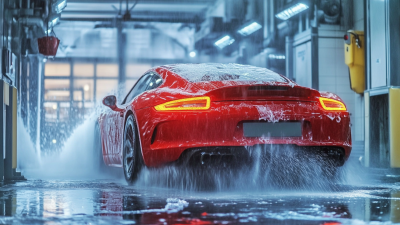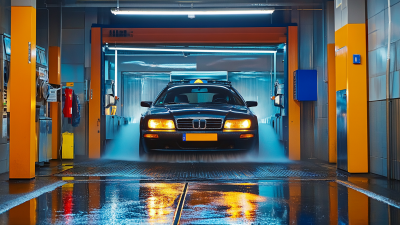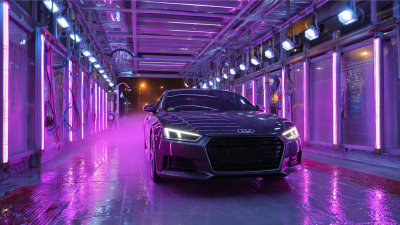Comprehensive Guide to Understanding Car Wash Machine Cost Factors and Pricing Strategies
When considering the investment in a car wash machine, understanding the various factors influencing the Car Wash Machine Cost is essential for business owners aiming to optimize their operations and profitability. According to a recent IBISWorld report, the car wash industry has seen steady growth, with a market size of approximately $11 billion in the U.S. alone, reflecting an annual growth rate of 3.8% over the past five years. This growth is driven by increased consumer demand for convenience and quality service, making it imperative for operators to analyze the pricing strategies associated with car wash machine acquisition and maintenance. Factors such as machine type, technology integration, operational costs, and regional market trends all play pivotal roles in determining the overall expenditure. This comprehensive guide aims to equip readers with the knowledge needed to make informed decisions, ultimately maximizing return on investment in the competitive car wash landscape.

Understanding the Key Cost Factors Influencing Car Wash Machine Prices
Understanding the cost factors influencing car wash machine prices is essential for entrepreneurs entering the rapidly expanding car detailing service market. As the global market is set to grow from $38.93 billion in 2025 to an impressive $56.59 billion by 2032, with a notable CAGR of 5.5%, it's crucial to dissect the elements that contribute to the pricing of car wash systems. Key factors include the technology employed, maintenance requirements, and operational efficiency. More advanced machines, equipped with touchless or automated features, tend to command higher prices due to their innovative technology and enhanced user experience.

Additionally, market trends indicate that sustainability challenges, especially within the electric vehicle battery value chain, are influencing the broader landscape of the car wash industry. As electric vehicles gain traction, car wash services must adapt by incorporating eco-friendly practices and machinery designed to handle the specific needs of electric cars. This shift can alter price factors significantly, as businesses invest in greener technologies to meet growing consumer expectations. Adapting to these trends is essential for those looking to thrive in the evolving car wash sector.
Evaluating Initial Investment vs. Long-term Operational Costs in Car Wash Machines
When investing in car wash machines, it's crucial to evaluate the initial investment against long-term operational costs. According to the International Carwash Association, the average initial investment for a car wash system can range from $200,000 to over $1 million, depending on the scale and technology used. This upfront cost includes equipment, site preparation, and installation, which can significantly impact budget planning.
However, understanding long-term operational costs is equally important. Maintenance, utility expenses, labor, and water usage can accumulate to as much as 60% of the total operating costs over time. A report from IBISWorld suggests that the average car wash in the U.S. spends about $80,000 annually on operating expenses. Factors like efficiency of the machinery and choice of eco-friendly products can help lower these ongoing costs.
By carefully balancing initial expenses with projected operational costs, business owners can make informed decisions that enhance profitability in the competitive car wash industry.
Analyzing Pricing Strategies Based on Market Trends and Competitive Landscape
When considering the acquisition of a car wash machine, understanding the pricing strategies based on market trends and competitive landscape is crucial. Pricing in this industry does not operate in isolation; it is influenced by various factors including technological advancements, consumer preferences, and the competitive environment. For example, manufacturers that introduce eco-friendly machines often command a premium price, reflecting the growing market demand for sustainability. Conversely, in highly competitive areas, businesses might adopt penetration pricing strategies to attract a larger customer base, even if it means lower profit margins initially.
Furthermore, analyzing competitor offerings can provide invaluable insights into pricing strategies. Businesses need to assess how rival car wash services are pricing their machines and the features they offer in order to position themselves effectively. For instance, if competitors are providing advanced features such as smart technology at a competitive price, it may necessitate a reevaluation of one’s own pricing strategy to maintain market relevance. Ultimately, staying attuned to market trends and competitor actions will empower businesses to establish pricing strategies that not only attract customers but also promote long-term profitability in the car wash machine sector.
Impact of Technology Advancements on Car Wash Machine Pricing Structures
The evolution of technology plays a crucial role in shaping car wash machine pricing structures. As manufacturers invest in cutting-edge technologies, the costs associated with advanced car wash systems naturally rise. Innovations such as touchless cleaning mechanisms, water reclamation systems, and automated service features have enhanced efficiency and customer experience. However, these improvements also result in higher initial investments for car wash operators, which often translates into varying pricing strategies in the market.
Moreover, advancements in technology influence maintenance costs and operational efficiencies. Modern machines often come with improved reliability and reduced downtime, which can offset initial investments over time. For instance, the integration of IoT (Internet of Things) technology allows for remote monitoring and diagnostics, reducing the need for frequent technician visits and enabling predictive maintenance. Operators can adjust their pricing to reflect these long-term savings while also appealing to environmentally-conscious consumers with water-saving technologies. As such, understanding the impact of these technological advancements is essential for anyone considering entering the car wash business or looking to upgrade their existing equipment.
Comprehensive Guide to Understanding Car Wash Machine Cost Factors and Pricing Strategies
| Cost Factor | Description | Impact on Pricing | Technology Influence |
|---|---|---|---|
| Machine Type | Self-serve, automatic, or in-bay | Varies greatly, automatic generally costs more | Advancements can improve efficiency |
| Brand Reputation | Established brands may charge a premium | Higher reputation often correlates with higher prices | Innovations can enhance brand value |
| Features | Additional features like drying, waxing | More features add to cost | New tech solutions can integrate multiple features |
| Installation and Setup | Costs associated with placing and setting up machinery | Directly impacts total initial investment | Modern systems may have simplified setups |
| Maintenance | Ongoing costs to maintain operation | Higher maintenance can lead to higher overall costs | Advanced tech typically requires less frequent servicing |
| Market Competition | Local competition can influence pricing | High competition may drive prices down | Tech advancements can differentiate offerings |
Regional Variations in Car Wash Machine Costs and Consumer Pricing Preferences
When considering the purchase of a car wash machine, it's essential to understand how regional variations impact costs and consumer pricing preferences. Different geographical areas can dramatically affect both the initial investment and operational costs. For example, urban locations often demand more sophisticated equipment due to higher vehicle traffic and customer expectations for quality. Conversely, rural regions might rely on simpler machines that meet basic needs, thus lowering upfront costs.

Moreover, regional consumer preferences play a significant role in shaping pricing strategies. In metropolitan areas, customers may prioritize speed and convenience, leading businesses to adopt pricing models that cater to quick, high-volume washes. Conversely, consumers in smaller towns might favor value-for-money options, prompting operators to offer more affordable packages or loyalty programs. By aligning pricing strategies with regional characteristics, car wash businesses can better meet customer expectations and remain competitive in their markets. Understanding these nuances is crucial for operators to maximize profitability while satisfying diverse consumer demands.
Related Posts
-

The Ultimate Guide to Understanding the Cost of the Best Car Wash Machines
-

Ultimate Guide to Choosing the Best Automatic Car Wash Equipment for Your Business
-

5 Compelling Reasons to Invest in the Best Car Wash Machine Cost Today
-

Future Innovations in Car Wash Technology The Definitive Guide for Global Buyers
-

Global Success Story: China's Best Self Car Wash Equipment Redefines Quality Standards Worldwide
-

7 Essential Tips for Maximizing Efficiency with Automatic Semi Truck Wash Solutions